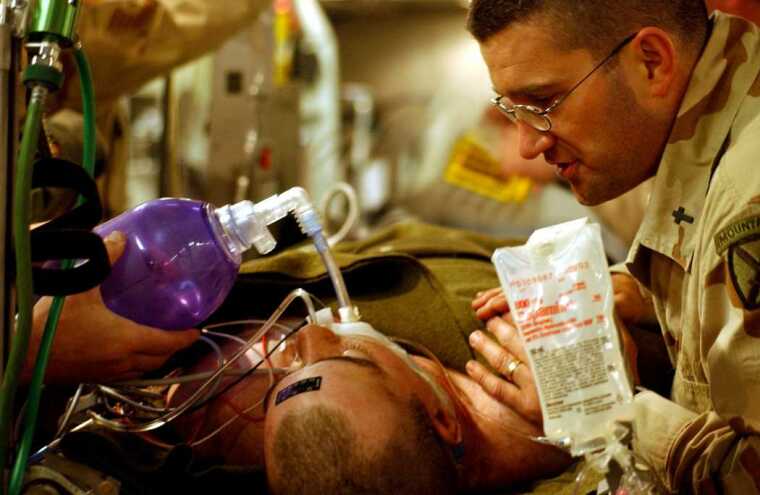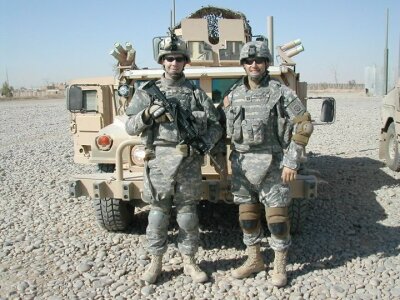Chaplains provide 'real arms & legs of God's love' to soldiers

FORT LEE, Va. (Christian Examiner) -- With 25 years of military experience, Major Stanton Trotter has seen up close the growing demands made on U.S. Army personnel while the country has been engaged in various conflicts.
Deployed three times to Iraq and twice to Afghanistan as a chaplain, Trotter said soldiers face deployments far from family, the threat of death, and the emotional trauma of taking another human being's life.
"I don't think the general population realizes how much we've asked of our military," Trotter said. He is the one responsible for meeting the spiritual and emotional needs of the soldiers in his unit.
In the military, that is no easy task. Emotional trauma can run deep when loss of life is more than just a movie scene with a chance for a make-over -- and spiritual life is challenged by families living continents apart from each other for months at a time.

"My main duties are to nurture the living, care for the wounded, and honor the fallen," Trotter told Christian Examiner. It was while he was studying for an undergraduate degree, the Army chaplain said he was "impressed that God had a work for me to do in the ministry."
So, following six years as a paratrooper in the 82nd Airborne division, Trotter became an Army chaplain. But those six years have served as a valuable entre to enlisted personnel, giving him credibility among the solders in his unit.
"Being enlisted for six years, I had exposure to Army life," he said. "I went through basic training. I experienced first-hand what it was like to be low on the totem pole. I could anticipate where they were going to need a touch from God, and what was going to be the biggest struggle for them."
Trotter said often what is required from army chaplains is their physical presence.
"The soldiers want their chaplain to be with them in the field," Trotter said. "They want them to be jumping from the same airplane, to be out in the field, and to experience the same life they have. When they see that, they can say 'this guy or gal is one of us and I can relate to them.'"
During deployments, physical proximity often means entering danger zones. Trotter was deployed during operation Anaconda, the first major American military operation in Afghanistan.
"There were times we were mortared," Trotter said. "A lot of my soldiers were wounded."
During his second deployment to Bagdad with the military police battalion, Trotter often went on missions with his battalion commander. They intentionally went to the most dangerous areas in order to comfort the troops.
Despite the danger, Trotter said he welcomed the opportunity for spiritual openness.
"When you talk about physical challenges, those are some of the most rewarding times for chaplains," Trotter said. "Soldiers' lives are really put in front of them. They're hungry to get right with God. They want the service their chaplain offers."
Trotter, like many others who serve overseas, struggles being away from his family.
"My second daughter was born one month after I left for deployment," he said. "Instead of 12 months, it was extended to 15 months. She was born and celebrated her first birthday before I came home."
When he is deployed, however, he is where the soldiers need him most -- and that's where he needs to be, said Trotter, who believes there has also been an increase in pressure on soldiers to maintain their presence in a number of places.
"Right now there's a feeling that to support our nation's interest, we are being sent lots of places, so the military is seeing this isn't going to stop," Trotter said. "We need to accept that the military is going to be a constant presence."
That constant demand means shorter turn-around time between deployments, he said, which makes military life more demanding today than in previous decades.
Eventually, the rigors and demands of military life wear on soldiers. With frequent deployments, it is often difficult for soldiers to address emotional needs. Some soldiers who are in battle must also confront the enormity of having taken a life on the battlefield.
"Killing another human being affects people more than you can possibly imagine," Trotter said. The effect of being involved in battle can affect a soldier immediately or a few years later -- but it will affect them "at some point," he said.
Though the timing is different for each, Trotter said, and his ministry of presence is nurturing and caring for soldiers, his primary aim is to point them to God.
"Chaplains provide the real arms and legs of God's love to these soldiers," Trotter said. "In many ways, we connect God to soldiers and soldiers to God."